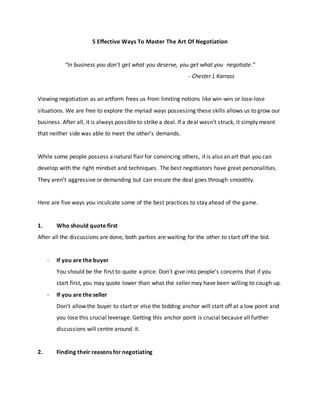5 Effective Ways To Master The Art Of Negotiation
- 1. 5 Effective Ways To Master The Art Of Negotiation ¡°In business you don¡¯t get what you deserve, you get what you negotiate.¡± - Chester L Karrass Viewing negotiation as an artform frees us from limiting notions like win-win or lose-lose situations. We are free to explore the myriad ways possessing these skills allows us to grow our business. After all, it is always possible to strike a deal. If a deal wasn¡¯t struck, it simply meant that neither side was able to meet the other¡¯s demands. While some people possess a natural flair for convincing others, it is also an art that you can develop with the right mindset and techniques. The best negotiators have great personalities. They aren¡¯t aggressive or demanding but can ensure the deal goes through smoothly. Here are five ways you inculcate some of the best practices to stay ahead of the game. 1. Who should quote first After all the discussions are done, both parties are waiting for the other to start off the bid. - If you are the buyer You should be the first to quote a price. Don¡¯t give into people¡¯s concerns that if you start first, you may quote lower than what the seller may have been willing to cough up. - If you are the seller Don¡¯t allow the buyer to start or else the bidding anchor will start off at a low point and you lose this crucial leverage. Getting this anchor point is crucial because all further discussions will centre around it. 2. Finding their reasons for negotiating
- 2. People mistakenly believe that the only way to convince the other person is by talking too much. But in some cases, silence can reveal more than words. If the other person says that the quote is too low, don¡¯t speak immediately. Your silence will get the other person to reveal the reason why they think so, landing useful information into your lap. Asking pointed questions will arm you with useful information that can work in your favour later. 3. When and how do you compromise Don¡¯t ever expect that your first number will be the final number. That¡¯s why you¡¯re negotiating in the first place. Even in businesses, we are bound to make compromises but they are always offset against something. How do you do that? ¡ñ If the other party is demanding a higher price, get them to give you something more in quality or quantity. ¡ñ If they¡¯re cutting down the price, take something out of your end to equalise that. ¡ñ Every time the other party makes a demand, ask them for the rationale behind it. If you make it a habit of giving without getting in return, the other person will feel entitled and even encouraged to ask you for more demands in future. If you make it even, they will think before they ask the next time. 4. My leverage and their leverage Just like an interview, you must never go unprepared to close a business deal. Read up on everything about the other side. ¡ñ What are their challenges? ¡ñ Are they under pressure? ¡ñ What options do they have? ¡ñ What value does this deal hold for them? ¡ñ Do you have something valuable that can give you a leverage?
- 3. The more you are aware about their pain points, you can accurately touch on their needs and get them to agree to your price. Sure, you are as much in need as the other person. But if you focus on their needs, you keep the power in your hand. 5. The unforgettable negotiating rules Not all negotiations conclude in the way both parties imagine. For any deal, you have to go prepared with your Best Alternative To a Negotiated Agreement (BATNA). If the offer is better than your BATNA, you take it, if not you reject it. This prepares you for the least you are willing you settle for as plan B. This will depend on factors like:- ¡ñ Do you have a minimum price you cannot do without? ¡ñ Is your product in high demand? Any negotiation also needs a contingency plan that need to be included in your deal sheet in case of cancellation. Enter every negotiation meeting with confidence but not over confidence. Follow these rules and you¡¯re likely to end up on the winning side.



